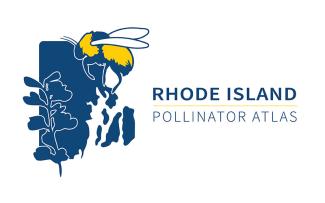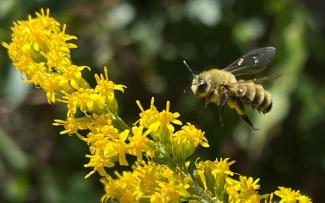The Rhode Island Pollinator Atlas

Background
Approximately 90% of plants require an animal pollinator to help them reproduce. Pollinators assist plants in their reproduction by carrying pollen from one flower to another, allowing the plant to produce seeds and fruits. In this way, pollinators play a vital role in supporting our health and food security, as well as contributing to the health of the environment. The majority of pollinators are insects, such as bees, moths, butterflies, flower flies, and wasps. Unfortunately, insect pollinators are experiencing global declines, which poses a risk to human and environmental health.
In 2021, the RIDEM Division of Fish & Wildlife caught the “buzz” on pollinators and launched an exciting new initiative called the Rhode Island Pollinator Atlas. The Atlas is an effort to inventory Rhode Island’s pollinating insects (bees, butterflies, moths, and flower flies) and to gather data that will inform future conservation plans to protect our insect pollinators. Conducting an inventory of our pollinators helps us to determine which species need our help, which unique plants and habitats are most important to our pollinators’ survival, and to assess current human and environmental threats to pollinators. Gathering this information will help us build management plans to promote and protect current and future pollinator populations.
Current Projects
Rhode Island Bumblebee Survey (RIBS)

The Rhode Island Bumblebee Survey (RIBS) is a two-year statewide community science survey of Rhode Island’s bumblebee and Eastern Carpenter Bee (Xylocopa virginica) populations. Bumblebees are important pollinators that visit a wide range of plants and pollinate many foods that we like to eat! Rhode Island is historically home to about 12 species of bumblebee; however, preliminary surveys undertaken by Dr. Howard Ginsberg and Dr. Steven Alm’s research groups at the University of Rhode Island (2014-2021) revealed that almost half of these species may have disappeared from the state.
Given their declines, it’s important that we determine the status and distribution of Rhode Island’s bumblebees, as well as the floral species and habitats associated with these species so that we can better protect them. To do this, the RIBS project is engaging community scientists to document bumblebee species and their habitats around the state. All you need is a love of nature, a smartphone, a lunchbox, and an insect net!
If you are interested in volunteering to survey bumblebees in Spring 2024, please fill out the form using the link below!
RI Bumblebee Survey Volunteer Interest Form
Rhode Island Wild Bee Observer (RIWBO)

The Rhode Island Wild Bee Observer is an ongoing community science project to help us determine the status and distribution of Rhode Island’s wild bee species. This information is essential for the effective conservation and management of these important insect pollinator species.
To participate, members of the public can easily submit their incidental observations of bees from anywhere in the state through the popular wildlife observation website and phone app, iNaturalist. Observations of all species, both common and rare, are welcome! Every time you see a bee just snap a quick photo and submit it to iNaturalist – it’s that easy!
To participate in RIWBO, check out the iNaturalist page!
Submit Bee Sighting via iNaturalist
NEW PROJECT: Rhode Island Wild Bee Survey (RIWBS)

The Rhode Island Wild Bee Survey (RIWBS) is a comprehensive, statewide survey of Rhode Island’s solitary, small eusocial, and small communal bee species. There are an estimated ~250 species of bee in Rhode Island. However, the state’s bees have never been comprehensively surveyed. Given the threat of decline, it is essential we conserve these important insects and the services that they provide through informed stewardship. Therefore, the main aims of this project are to determine the status and distribution of Rhode Island’s wild bee species, as well as the floral species and habitats associated with them, to inform their future management. To achieve these aims, the RIWBS project uses mindful bee collection methods to effectively identify and monitor these important species.
If you are interested in learning more about this project and potentially volunteering for RIWBS in Spring 2024, please fill out our form using the link below!
RI Wild Bee Survey Volunteer Interest Form





